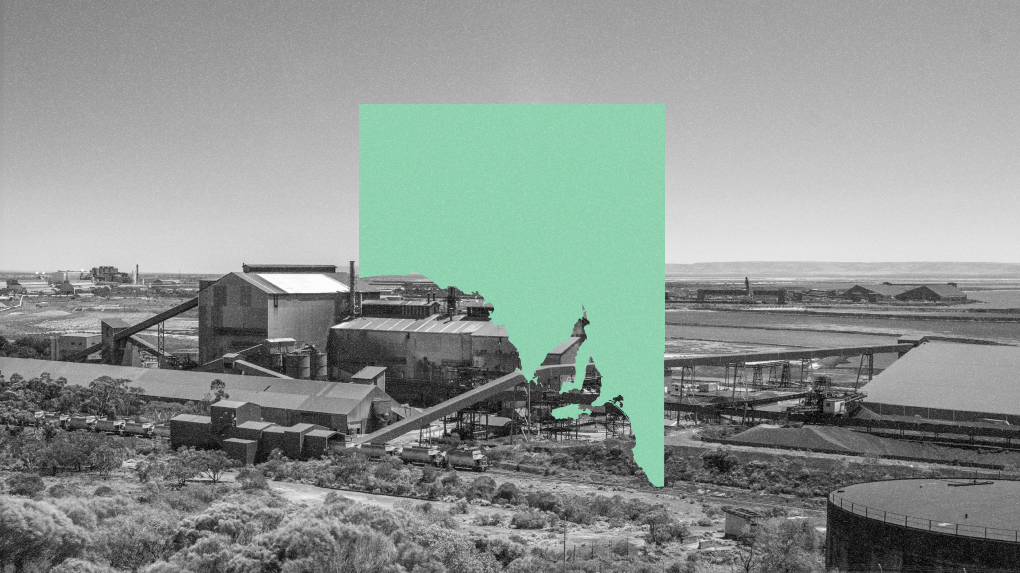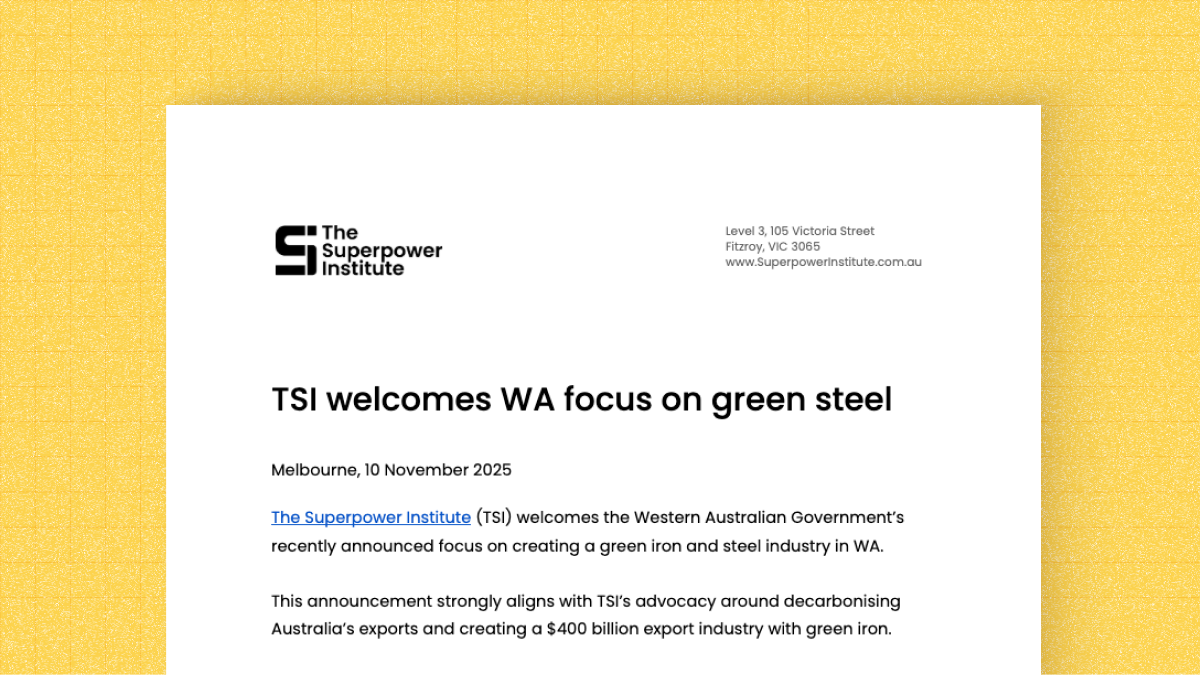Transcript:
Australia stands at the cusp of a transformative opportunity—an opportunity that could see it become a global leader in green exports, driving Australia’s economic long term prosperity and significant reductions in global carbon emissions. This vision, championed by The Superpower Institute (TSI), offers a blueprint for how Australia can leverage its vast renewable energy resources to transition from a fossil-fuel-based economy to one centred on sustainable, green exports.
The concept of Australia as a "Superpower" in renewable energy and green exports was brought into the spotlight by Ross Garnaut, one of TSI's founders and a current director. His vision, articulated in Superpower and The Superpower Transformation, posits that Australia’s vast renewable energy potential can serve as the foundation for a thriving green export economy. The essence of this is captured by Garnaut:
"In a zero-carbon world economy, there would be no economic sense in any aluminium or iron smelting in Japan or Korea, not much in Indonesia, and enough to cover only a modest part of demand in China and India. The European commitment to early achievement of zero net emissions opens a large opportunity there as well. How big is Australia? Converting one-quarter of Australian iron oxide and half of aluminium oxide exports into metal would add more value and jobs than current coal and gas combined."
This vision is not just about economic transformation; it’s about making a substantial contribution to global decarbonisation. According to TSI's estimates, Australia has the potential to reduce global emissions by 6-9% through green export opportunities, with green iron alone contributing around 4% of this reduction.
TSI has been actively advocating for policies that can turn this vision into reality. In the lead-up to the May 2024 budget, our efforts focused on promoting Australia's Superpower opportunity publicly, for example at the National Press Club, and with key stakeholders in Canberra. The inclusion of the "Future Made in Australia" initiative in the budget was an important step in the right direction, but it’s just the beginning. The proposed $2/kg support for green hydrogen is also pivotal, as is the government’s focus on low-carbon liquid fuels.
Our research, led by Dr Reuben Finighan, explains the immense opportunity Australia has before it. It demonstrates that Australia’s trade partners will increasingly rely on external sources for their decarbonisation efforts, opening the door for Australia to step in as a key supplier of green commodities.
Australia’s trade partners will increasingly rely on external sources for their decarbonisation efforts, opening the door for Australia to step in as a key supplier of green commodities.
Australia’s trade partners will increasingly rely on external sources for their decarbonisation efforts, opening the door for Australia to step in as a key supplier of green commodities.
In a net-zero world, countries in East, Southeast, and Southern Asia will likely use most, if not all, of their zero-carbon energy capacity to meet domestic needs, leaving little surplus for tradable commodities like iron. This is where Australia’s comparative advantages—abundant renewable energy, minerals, and biomass—can position it as a crucial partner in global decarbonisation.
Green Iron is at the forefront of the Superpower opportunity.
The establishment of a green iron industry in Australia will require substantial government support, particularly in its early stages. This support is not just necessary; it is appropriate given the enormous potential of the opportunity. Investments in renewable energy, green hydrogen, and common user infrastructure will be crucial in rewarding early and risky investments that others can learn from, laying the foundation for a successful industry.
One of the most critical factors for the success of green iron industries is global carbon pricing. The European Union’s Carbon Border Adjustment Mechanism (CBAM) is a step in this direction, and Australia needs to adopt a similar measure. Establishing a green premium for products like green iron will be essential in ensuring the competitiveness of Australian exports in a decarbonising world.
Diplomatic efforts through strategic partnerships, particularly in Asia, are another crucial element of this strategy. As the decarbonisation imperative becomes increasingly apparent to overseas industries and governments, it will be essential that our trade partners also recognise Australia as a viable and attractive partner. Joint efforts in effectively pricing carbon and promoting partnerships with Australia for green iron production will be key to securing our place in the global market.
The potential benefits of embracing the Superpower opportunity are immense, with the green iron opportunity alone estimated to be worth three times the current value of Australia’s iron ore exports, around $300 billion per year. But this opportunity comes with a clear urgency. If we do not act now, others will.
The potential benefits of embracing the Superpower opportunity are immense, with the green iron opportunity alone estimated to be worth three times the current value of Australia’s iron ore exports, around $300 billion per year. But this opportunity comes with a clear urgency. If we do not act now, others will.
The potential benefits of embracing the Superpower opportunity are immense, with the green iron opportunity alone estimated to be worth three times the current value of Australia’s iron ore exports, around $300 billion per year. But this opportunity comes with a clear urgency. If we do not act now, others will.
Many steel producers in Asia already have decarbonisation plans and have begun investing in or partnering with international suppliers of green iron. This is a clear signal that their commitments are real, and the opportunity for Australia to be a part of their plans is significant. However, Australia is not the only game in town. Without the right policy settings, others could easily outpace us.
TSI sees an ambitious but achievable target for green iron production of 10 million tonnes per annum by 2030. To reach this target, investments need to start immediately, along with the policy frameworks to support them. Australia's track record of tackling and delivering big economic reforms gives us confidence that we can meet this challenge.
Australia has a clear and transformative opportunity to lead the world in green energy exports, particularly in green iron. The path is clear, and the opportunity is ours to seize—if we act with the urgency and ambition that this moment demands.
The Superpower Institute will be leading the way, doing the research, changing the narrative and helping unlock green export opportunities.
Baethan Mullen
Chief Executive Officer
Baethan Mullen has over 20 years of experience in public policy, economics and advocacy. Prior to joining the Superpower Institute, Baethan was General Manager of Economics & International at the ACCC, and led the largest energy efficiency program in Australia as Executive Director at the Essential Services Commission.



